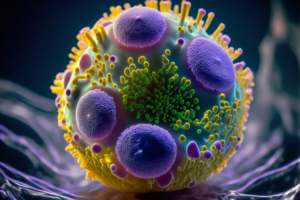EXOSOMES
What Are Exosomes?

Exosomes are small extracellular vesicles that play a crucial role in cell-to-cell communication and the transfer of biological molecules between cells. These tiny vesicles are released by many different cell types, including immune cells, and various other cell types. They contain a diverse array of proteins, lipids, and nucleic acids, such as RNA and DNA.
How Do Exosomes Work?
Exosomes are formed within cells through a complex process. They are derived from the endosomal system, where intracellular vesicles called multivesicular bodies (MVBs) bud off the cell’s endosomal membrane. These MVBs can eventually fuse with the cell’s plasma membrane, releasing the exosomes into the extracellular space.
Exosomes are involved in intercellular communication and the transfer of biological material between cells. They can transmit information by delivering bioactive molecules to recipient cells, influencing various cellular processes such as growth, differentiation, and immune response. Exosomes have been implicated in both physiological and pathological processes.
Therapeutic Potential:
Exosomes are being investigated for their potential therapeutic applications in regenerative medicine, drug delivery, and disease treatment. Their ability to carry various bioactive molecules makes them promising candidates for targeted delivery of therapeutic agents, such as drugs or genetic material, to specific cells or tissues.
Role in Regenerative Medicine:
Exosomes have gained significant attention in the field of regenerative medicine due to their potential therapeutic properties. They have been found to possess anti-inflammatory, immunomodulatory, and tissue regenerative capabilities. Exosomes derived from other cell types can deliver therapeutic cargo to target cells or tissues, promoting tissue repair, modulating immune responses, and stimulating regenerative processes.
Research Areas:
Exosomes have been studied in various fields, including:
- Cancer Research: Exosomes play a role in tumor progression, metastasis, and immune response evasion.
- Neurodegenerative Diseases: They are being explored in diseases like Alzheimer’s and Parkinson’s for their potential involvement in disease pathology and as carriers for drug delivery to the brain.
- Regenerative Medicine: Exosomes are investigated for their potential to promote tissue repair and regeneration.
- Immunology: Exosomes are involved in immune response regulation and antigen presentation.
Isolation and Characterization:
Isolating exosomes from biological samples can be challenging due to their small size and similarity to other vesicles. Various techniques are used, such as ultracentrifugation, size-exclusion chromatography, and immune-affinity capture. Characterization typically involves methods like electron microscopy, nanoparticle tracking analysis, and protein or nucleic acid profiling.
Exosome research is a rapidly growing field with potential implications for various medical applications. However, there is ongoing research to understand better their mechanisms, cargo, and potential therapeutic uses, and further clinical studies are needed to determine their safety and effectiveness in various contexts.
IF YOU NEED TO SEE A SPECIALIST, CONTACT US TO SCHEDULE YOUR APPOINTMENT TODAY!
Contact Us
Ask a question or book an appointment below.
